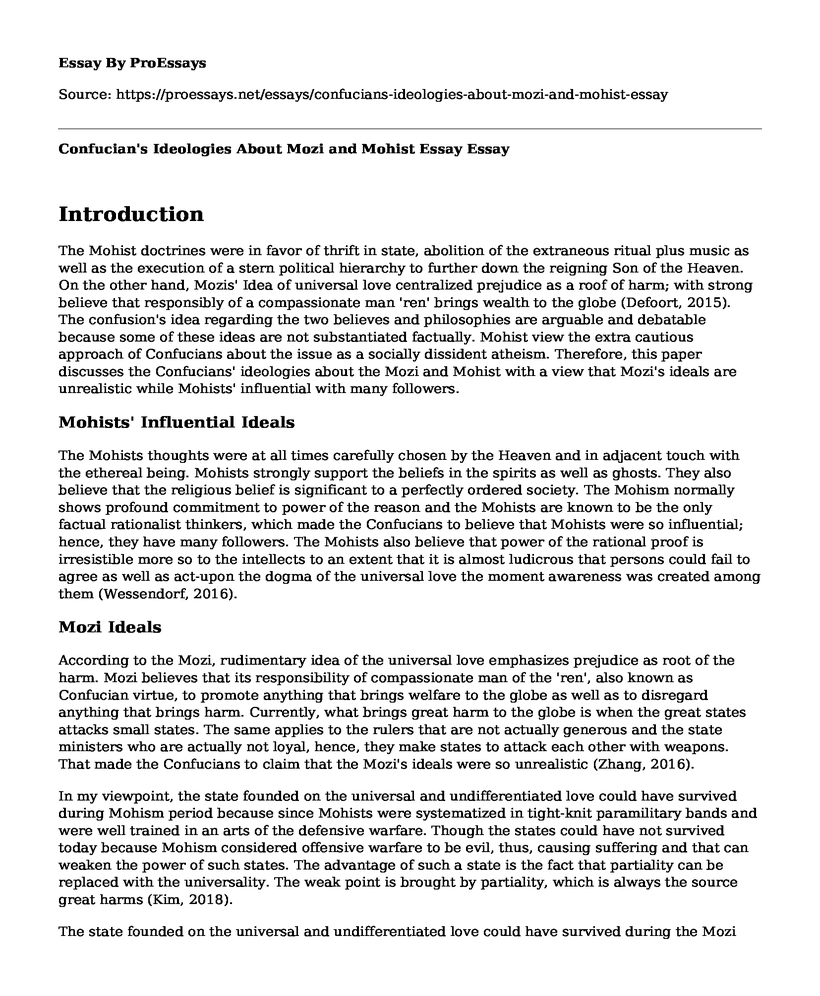Introduction
The Mohist doctrines were in favor of thrift in state, abolition of the extraneous ritual plus music as well as the execution of a stern political hierarchy to further down the reigning Son of the Heaven. On the other hand, Mozis' Idea of universal love centralized prejudice as a roof of harm; with strong believe that responsibly of a compassionate man 'ren' brings wealth to the globe (Defoort, 2015). The confusion's idea regarding the two believes and philosophies are arguable and debatable because some of these ideas are not substantiated factually. Mohist view the extra cautious approach of Confucians about the issue as a socially dissident atheism. Therefore, this paper discusses the Confucians' ideologies about the Mozi and Mohist with a view that Mozi's ideals are unrealistic while Mohists' influential with many followers.
Mohists' Influential Ideals
The Mohists thoughts were at all times carefully chosen by the Heaven and in adjacent touch with the ethereal being. Mohists strongly support the beliefs in the spirits as well as ghosts. They also believe that the religious belief is significant to a perfectly ordered society. The Mohism normally shows profound commitment to power of the reason and the Mohists are known to be the only factual rationalist thinkers, which made the Confucians to believe that Mohists were so influential; hence, they have many followers. The Mohists also believe that power of the rational proof is irresistible more so to the intellects to an extent that it is almost ludicrous that persons could fail to agree as well as act-upon the dogma of the universal love the moment awareness was created among them (Wessendorf, 2016).
Mozi Ideals
According to the Mozi, rudimentary idea of the universal love emphasizes prejudice as root of the harm. Mozi believes that its responsibility of compassionate man of the 'ren', also known as Confucian virtue, to promote anything that brings welfare to the globe as well as to disregard anything that brings harm. Currently, what brings great harm to the globe is when the great states attacks small states. The same applies to the rulers that are not actually generous and the state ministers who are actually not loyal, hence, they make states to attack each other with weapons. That made the Confucians to claim that the Mozi's ideals were so unrealistic (Zhang, 2016).
In my viewpoint, the state founded on the universal and undifferentiated love could have survived during Mohism period because since Mohists were systematized in tight-knit paramilitary bands and were well trained in an arts of the defensive warfare. Though the states could have not survived today because Mohism considered offensive warfare to be evil, thus, causing suffering and that can weaken the power of such states. The advantage of such a state is the fact that partiality can be replaced with the universality. The weak point is brought by partiality, which is always the source great harms (Kim, 2018).
The state founded on the universal and undifferentiated love could have survived during the Mozi time since Mozi considered the primary premise of the universal love to be partiality as the root of the harm. Though the states could have survived today because they tend to eliminate whatever thing can brings harm to the state.
The advantage of such a state is because they promote radical conservatism. The weak point is whereby there are base persons in such states who can injure as well as assault each other with the weapons, poison, water, knives as well as fire (Wang, 2016).
Conclusion
In conclusion, the Confucians claim that Mozi's ideals were unrealistic is not entirely true since some of their ideals seem to be much realistic. The Confucians claim that Mohists were influential is true. The Mohist have many followers because they show profound commitment to power of the reason.
References
Defoort, C. (2015). The Modern Formation of Early Mohism: Sun Yirang's Exposing and Correcting the Mozi. T'oung Pao, 101(1-3), 208-238.
Kim, S. M. (2018). Justification by Heaven: A Comparative Analysis of Political Legitimacy in Confucianism and Mohism. Armstrong Undergraduate Journal of History, 8(1), 1.
Wang, Z. (2016). The Diversity of Eastern Zhou Views on Deities and The Divine Insight of Spirits and Gods. In Order in Early Chinese Excavated Texts (pp. 83-106). Palgrave Macmillan, New York.
Wessendorf, M. (2016). Brecht's Materialist Ethics between Confucianism and Mohism. Philosophy East and West, 66(1), 122-145.
Zhang, Q. (2016). Equality and Universal Love: Human Dignity in Mohism. In Human Dignity in Classical Chinese Philosophy(pp. 143-172). Palgrave Macmillan, New York.
Cite this page
Confucian's Ideologies About Mozi and Mohist Essay. (2022, Aug 23). Retrieved from https://proessays.net/essays/confucians-ideologies-about-mozi-and-mohist-essay
If you are the original author of this essay and no longer wish to have it published on the ProEssays website, please click below to request its removal:
- Essay on Role of Family in Bereavement
- Annotated Bibliography: Christianity
- Historical Determinism and Marxism Theory Essay Example
- Essay Sample on Aristotle's Timeless Wisdom: The Power of Character in Business
- Essay Example on Bible-Based Accounting & Finance: Parables for Success
- Research Paper on Confucius: Advocating Ethical Reform and the Golden Rule
- "Fathers & Sons: The Legacy of William Shakespeare" - Essay Sample







